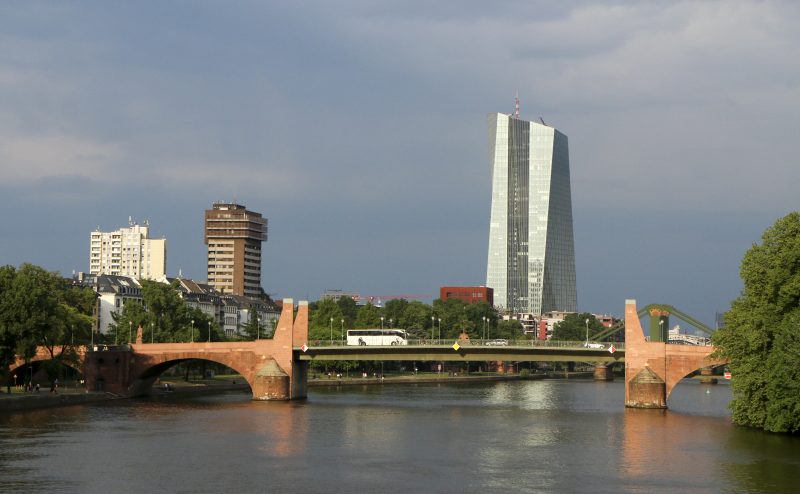Eyes on ECB to reverse eurozone slowdown
The European Central Bank in Frankfurt might be ready to resume low-cost loans to banks to boost economic growth (Yann Schreiber)
Frankfurt am Main (AFP) – The European Central Bank is poised to offer Thursday a glimpse of plans to halt a eurozone slowdown, analysts say, as the Frankfurt institution is almost certain to downgrade growth and inflation forecasts.
Just three months after ending a trillion-euro stimulus for the bloc, the ECB is under renewed pressure to offer ways to reignite the eurozone’s sputtering engine.
A gaggle of international organisations including the European Commission and the IMF have already lowered their outlooks for the 19-nation bloc after geopolitical uncertainty, stuttering output in emerging markets and trade conflicts helped put the brakes on expansion in 2018.
On Wednesday it was the turn of rich-country club the OECD to issue one of the gloomiest eurozone predictions yet, expecting growth to reach just one percent.
Powerhouse Germany and debt-burdened Italy came off worst in the revision due to their “relatively high exposures to the global trade slowdown,” the Paris-based organisation said.
ECB staff are unlikely to be so pessimistic, with most analysts expecting a cut of 0.2 to 0.3 points to its December projection of 1.7 percent growth in 2019.
“Any revision which does not go lower than the current consensus of 1.4 percent is simply proof of the ECB’s sense of reality and no reason to panic,” ING DiBa bank economist Carsten Brzeski said.
Future growth is difficult to judge for now as “the eurozone still wobbles between decent domestic demand and increased external risks,” he added.
– Strong storms, strong foundations –
Both “soft” indicators such as business confidence and “hard” data like industrial production have fallen in recent months in the single currency area.
Trade conflicts between Washington, Brussels and Beijing, slowing growth in important export markets like China and looming uncertainty over Britain’s withdrawal from the European Union, or Brexit, have undermined confidence and slowed economic expansion.
ECB President Mario Draghi acknowledged in January that “risks surrounding the euro area growth outlook have moved to the downside” — but singled out such external factors as causes for the gloomier picture.
Domestically, unemployment held steady in February at 7.8 percent, its lowest level since 2008, the EU statistics authority Eurostat said last week.
And wages are rising in countries like Germany where shortages of skilled workers are making themselves felt.
But the stronger labour market has not had the expected impact of boosting inflation towards the ECB’s target of close to, but below 2.0 percent — the core of its mandate to secure price stability over the medium term.
Year-on-year price growth was just 1.5 percent in February and 1.4 percent in January, Eurostat said, with the “core” figure — ruling out volatile items like food, alcohol and energy — even lower at 1.0 percent.
The ECB will likely further reduce its inflation outlook Thursday from December’s projections, which called for the rate to rise from 1.6 percent this year to 1.8 percent by 2021.
– Cheap loans to banks? –
Some observers see the ECB blocked from responding to the soft patch in growth after years of crisis firefighting.
In December it ended more than three years of mass “quantitative easing” purchases of government and corporate bonds, which ultimately amounted to 2.6 trillion euros ($3.0 trillion) — although it will for now replenish its stock as bonds mature.
Meanwhile interest rates are fixed at historic lows “at least through the summer of 2019” in its regular policy statements — leaving little room to stimulate the economy by traditional means.
The ECB’s governing council would be loath to restart bond purchases short of a major crisis.
And lowering rates still further is unrealistic, although the horizon for raising them could be pushed further into the future.
Another option widely mooted in recent weeks — including by ECB board members — is a repeat of low-cost loans to banks known as targeted long-term refinancing operations (TLTROs).
Keeping banks well supplied with cash could prevent a squeeze in lending to the real economy which would in turn hinder growth and inflation.
“The question is how fast the ECB can reach a consensus” between more and less interventionist members of its governing council on delaying rate rises and boosting credit, Pictet bank analyst Frederik Ducrozet said.
Rather than take action immediately, Thursday could see Draghi launch technical work on new TLTROs, with an announcement in April and implementation in June, Ducrozet suggested.
Disclaimer: This story is published from a syndicated feed. Siliconeer does not assume any liability for the above story. Validity of the above story is for 7 Days from original date of publishing. Content copyright AFP.


